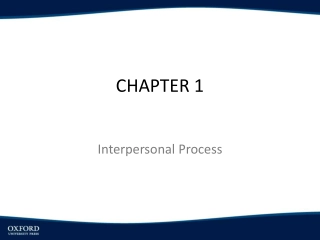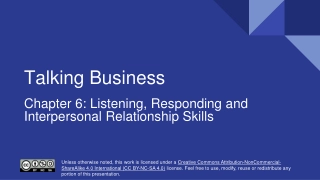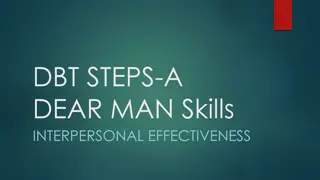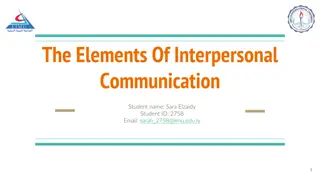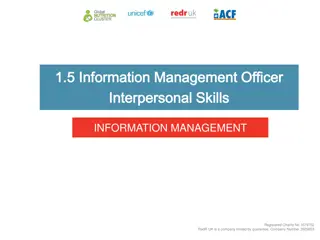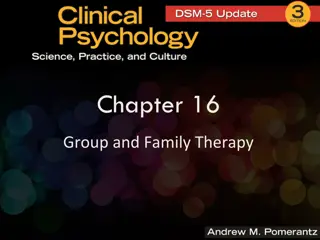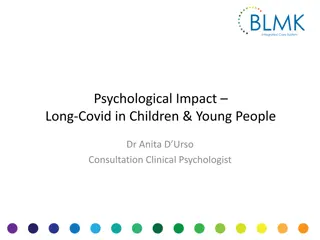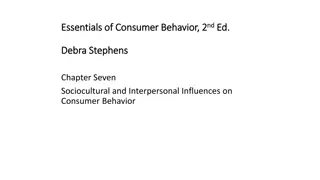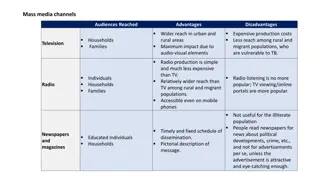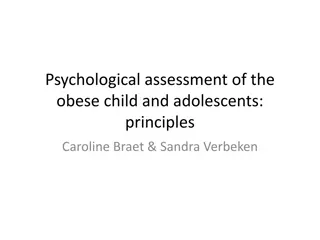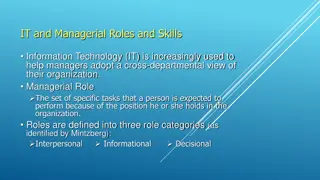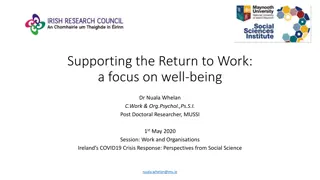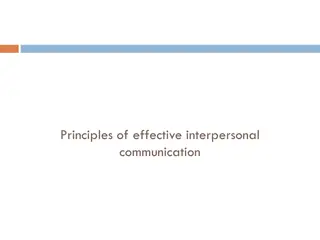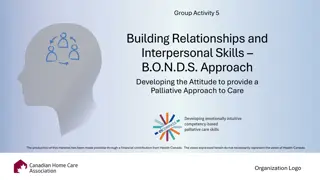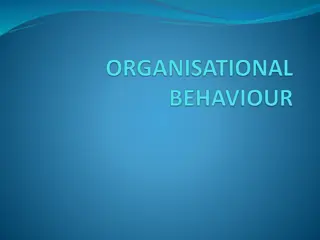Interpersonal Process
Explore the significance of interpersonal communication in addressing physical, social, and practical needs, the impact of technology and cultural diversity, and the importance of communication competence.
0 views • 27 slides
Enhancing Interpersonal Communication Skills
Explore the dynamics of interpersonal communication in this chapter, covering topics such as social penetration theory, self-disclosure principles, intrapersonal communication, and self-concept understanding. Learn how to improve communication effectiveness and relationships through active listening
0 views • 13 slides
Psychological Claims in the Workplace
Exploring the rise of psychological claims in work comp, this information covers types of mental stress claims, psychological claim regulations by state, standards of causation for physical injury-mental stress and mental stress-mental stress, as well as examples of how work-related stress can impac
1 views • 22 slides
Interpersonal factors and their impact on pain transitions
Exploring the impact of interpersonal factors on pain transitions, this research delves into the communication and behaviors between individuals experiencing pain, such as parent-child relationships and interactions with healthcare providers. The study analyzes psychosocial mechanisms influencing pa
4 views • 24 slides
Effective Strategies for Managing Interpersonal Conflict at Work
In this seminar led by experts in organizational psychology, attendees learn practical approaches to reduce interpersonal conflict fallout in the workplace. Discussions range from understanding individual and organizational factors influencing conflict to exploring remedies for resolving conflict es
1 views • 21 slides
Responsibilities in Ensuring Psychological Health and Safety
The primary duty of care under the WHS Act 2011 encompasses physical and psychological health. Non-compliance can lead to significant penalties, including fines and imprisonment. To address psychological impacts, implementing strategies like ALGEE from Mental Health First Aid Australia can help redu
0 views • 8 slides
Effective Communication Using DEAR MAN Skills in Interpersonal Relationships
DEAR MAN is a mnemonic device that helps in utilizing assertiveness and interpersonal skills in personal situations. It involves steps like Describe, Express, Assert, Reinforce, BE Mindful, Appear Confident, and Negotiate. By following these steps, individuals can effectively communicate their needs
8 views • 11 slides
Mastering Interpersonal Communication Skills for Success in the Workplace
Interpersonal communication involves the exchange of information, ideas, and feelings through verbal and non-verbal methods. Developing strong skills in encoding, decoding, feedback, and utilizing different communication mediums is crucial for effective communication. Good interpersonal skills enhan
1 views • 9 slides
Interpersonal and Intrapersonal Conflicts in Business Administration
Exploring the differences between interpersonal and intrapersonal conflicts, this presentation delves into the meaning of conflicts, their occurrence, key topics, and resolution strategies. It highlights conflict scenarios in various settings and emphasizes the importance of effective communication
2 views • 11 slides
Evolution of Mathematical Theories and Proof Systems
Development of mathematical theories such as model theory, proof theory, set theory, recursion theory, and computational complexity is discussed, starting from historical perspectives with Dedekind and Peano to Godel's theorems, recursion theory's golden age in the 1930s, and advancements in proof t
2 views • 29 slides
Improving Interpersonal Skills for Effective Information Management
Enhancing interpersonal skills is crucial for Information Management Officers (IMOs) to work effectively with diverse stakeholders. This includes understanding various perspectives, tailoring communication, listening actively, and leading stakeholders. Challenges like inter-personal issues can imped
0 views • 29 slides
Therapeutic Factors in Group Therapy: Enhancing Interpersonal Relationships
Explore the therapeutic factors in group therapy that focus on enhancing interpersonal relationships, instilling hope, promoting universality, and fostering group cohesiveness. Through interactions with fellow group members, clients can improve their interpersonal skills and generalize lessons learn
0 views • 29 slides
Psychological Theories of Criminality: Understanding the Roots
Psychological theories of criminality delve into the association between intelligence, personality, learning, and criminal behavior. Major theories include Psychodynamic Theory by Freud, Behavioral Theory by Bandura, and Cognitive Theory by Kohlberg. These theories explore how unconscious mental pro
1 views • 20 slides
Theory of Firms: Neoclassical vs. Modern Approaches
The theory of firms is explored through the Neoclassical and Modern perspectives. Neoclassical theory focuses on profit maximization, while Modern theory delves into managerial, principal-agent, and transaction cost theories. The discussion covers criticisms of Neoclassical theory and the essential
1 views • 79 slides
Unbound Minds Psychological Clinic For Children And Adolescent | Book Now
Unbound Minds Psychological Clinic, is a top-notch psychological clinic, we dedicated genuine & best psychological treatment with professional team. Get certified treatment with more benefits. Hire our experienced psychologist and get rid of stress a
1 views • 2 slides
Theories of Causation in Psychological and Social Sciences
Overview of theories of causation categorized into psychological, social psychological, and sociological perspectives. Psychological theories focus on instinctive, biological, and psychological qualities of abusers, including Attachment Theory, Psychodynamic Theory, Social Learning Theory, and Situa
0 views • 15 slides
Evolution of Light Theory: From Wave Theory to Quantum Theory
At the turn of the century, the discovery of the photoelectric effect challenged the wave theory of light, leading to the development of the quantum theory by Max Planck and Albert Einstein. This new theory introduced the concept of discrete energy units known as quanta, bridging the gap between wav
2 views • 62 slides
Mental Health, Substance Use, and Interpersonal Violence in Baltimore EMA Agencies
Explore the use of screening tools in Baltimore EMA agencies to ensure appropriate processes for addressing mental health, substance use, and interpersonal violence. Emphasis on reliability, validity, and data collection methods through a survey conducted across various agencies in the area.
0 views • 19 slides
Psychological Impact of Long Covid in Children and Young People
Psychological impact of Long Covid in children and young people includes sleep problems, worsening of pre-existing psychiatric symptoms, emotional distress like depression and anxiety, and mixed results in terms of quality of life and resilience. Beyond physical symptoms, psychological effects such
2 views • 5 slides
Enhancing Sports Performance Through Psychological Skill Training
Sports psychology delves into the psychological factors affecting athletic performance, emphasizing the importance of Psychological Skills Training (PST) to equip athletes with mental skills tailored to their individual needs. These skills techniques help in enhancing self-confidence, goal-setting,
0 views • 29 slides
Sociocultural and Interpersonal Influences on Consumer Behavior
Explore how cultures, social identities, friends, family, and reference groups affect consumer behavior. Learn about the impact of interpersonal relationships on product sharing and brand experiences. Understand the significance of cultural influences, reference groups, and how they shape consumer d
0 views • 6 slides
Overview of Psychological Theory in Literature
Psychological theory in literature encompasses two critical viewpoints - one focusing solely on the text itself and the other on the author. The first approach delves into conflicts, characters, dream sequences, and symbols present in the work, revealing inner desires and conflicts within characters
0 views • 17 slides
Effective Communication Strategies for Health Promotion
This comprehensive guide explores various mass media channels, mid-media outdoor publicity materials, and interpersonal communication strategies for reaching different audiences with health messages. It discusses the advantages and disadvantages of each method, including their reach, cost implicatio
0 views • 6 slides
Psychological Disorders: Theoretical Approaches and Abnormal Behavior
Explore the realm of psychological disorders through theoretical approaches such as the Biological, Psychological, and Sociocultural models. Delve into the complexities of abnormal behavior, including definitions and examples. Gain insights into the impact of biological, psychological, and sociocult
0 views • 47 slides
Theories of Interest in Microeconomics II
Explore various theories of interest in economics, including the Classical Theory, Liquidity Preference Theory by Keynes, Productivity Theory, Abstinence Theory, Time-Preference Theory, Fisher's Time Preference Theory, and the Loanable Fund Theory. These theories offer different perspectives on the
1 views • 6 slides
Interpersonal Needs and Conflict Resolution in Personal Growth
Explore the importance of interpersonal needs such as inclusion, control, and affection in personal growth along with conflict resolution strategies like problem-solving, emotional intelligence, and communication skills. Discover insights on FIRO-B theory and practical skills for managing conflicts
0 views • 10 slides
Significance of Psychological Theories in Understanding Suicidal Behavior
Psychological theories play a crucial role in guiding research, clinical work, and the development of new hypotheses related to suicidal behavior. The Interpersonal-Psychological Theory of Suicidal Behavior emphasizes social forces, such as disturbed regulation of individuals by society, social inte
0 views • 14 slides
Psychological Assessment of Obese Children and Adolescents
Principles of psychological assessment in obese children and adolescents are discussed, including the Dietary Restraint Theory (DRT), Affect Regulation Theory (ART), Reinforcement Sensitivity Theory (RST), and Diathesis-Stress Model (DSM). These theories explore the cognitive, emotional, and environ
0 views • 5 slides
Managerial Roles and Skills in Information Technology (IT)
Information Technology (IT) is increasingly utilized by managers to gain a comprehensive view of their organization. Managers perform various roles categorized as Interpersonal, Informational, and Decisional according to Mintzberg. Decisional roles involve strategic planning, resource management, an
0 views • 4 slides
Analysis of Data Collection Practices for Interpersonal Violence Services in Peel
The Peel Institute on Violence Prevention conducted a pilot study in May 2015 to identify gaps in data collection practices of health, justice, and social service agencies serving survivors of interpersonal violence in the Peel region. The study aimed to understand service availability, standardize
0 views • 38 slides
Supporting Well-Being for Return to Work Amidst COVID-19 Crisis: Focus on Psychological Health
Amidst the challenges of returning to work post-COVID-19, it is essential to prioritize well-being and psychological health for a successful transition. Dr. Nuala Whelan's research sheds light on the impact of unemployment, emphasizing the need for support in job matching, upskilling, and psychologi
0 views • 9 slides
The Relationship Between Cognitive Flexibility and Psychological Flexibility After Acquired Brain Injury
This study explores how cognitive flexibility and psychological flexibility interact after an acquired brain injury. It examines whether individuals who exhibit cognitive inflexibility can achieve psychological flexibility, considering the impact of cognitive impairments post-injury. Cognitive flexi
0 views • 21 slides
Mastering Effective Interpersonal Communication: Key Principles and Strategies
Effective interpersonal communication is essential for human existence, impacting our happiness and relationships. This entails clear encoding, minimal noise, and strategic message delivery. Communicators must possess expertise, charisma, and sincerity. Messages should appeal to logic and evoke emot
1 views • 20 slides
Developing Emotional Intelligence and Interpersonal Skills in Palliative Care
Enhance emotional intelligence skills in healthcare for improved collaboration and patient outcomes. Focus on building interpersonal relationships through the B.O.N.D.S approach, valuing voices of patients and family members, and fostering effective communication. By practicing empathy, active liste
0 views • 8 slides
Insights on Interpersonal Attraction, Relationships, and Love
Discover the significance of relationships in life, explore factors influencing interpersonal attraction like proximity, similarity, and physical appearance. Delve into stereotypes related to attractiveness, learn about Sternberg's Triangular Theory of Love, different types of love such as Companion
0 views • 29 slides
Psychological Safety for Inclusive Environments
This presentation explores the components of psychological safety according to current research, emphasizing its role in fostering inclusive environments. It delves into the NASA Science Strategic Approach, defines psychological safety based on Dr. Timothy Clark's 4-stage model, discusses team psych
0 views • 11 slides
Psychological Flexibility and Relationship Quality Study
This study explores the relationship between psychological flexibility, individual wellbeing, and relationship quality. It reveals correlations between psychological flexibility, positive affect, negative affect, satisfaction with life, psychological wellbeing, and relationship quality in romantic r
0 views • 18 slides
Psychological Flexibility through Embodied Knowledge
Psychological flexibility plays a crucial role in mental well-being and behavior. This study explores whether untrained individuals can grasp psychological flexibility concepts based on body language and how people physically express flexibility or inflexibility in response to challenging situations
0 views • 18 slides
Factors Affecting Interpersonal Skills Among Second Year Medical Students at UKMMCLab.3Medicine & Society Faculty
This study by Associate Prof. Dr. Azmi Bin Mohd Tamil explores the interpersonal skills among second-year medical students at UKMMCLab.3Medicine & Society Faculty of Medicine, Universiti Kebangsaan Malaysia, under the facilitation of Dr. Haikal Ghazali.
0 views • 32 slides
Theories of Personality: Type Theory, Trait Theory, Psychoanalytic Theory
Personality theories such as Type Theory, Trait Theory, and Psychoanalytic Theory classify personality based on various factors like body build, introversion/extroversion, enduring characteristics, and unconscious forces influencing behavior.
0 views • 13 slides
